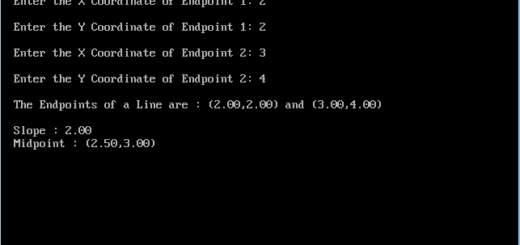Prime number or Not in C using do-while Loop
Before going to the program for Prime Number or Not first let us understand what is a Prime Number?
Prime Number:
A Prime Number is a number greater than 1 and which is only divisible by 1 and the number itself.
For example,
11 is a Prime Number, because 11 is not divisible by any number other than 1 and 11.
To find whether a Number is Prime Number or Not it is enough to check whether ‘n’ is divisible by any number between 2 and √n. If it is divisible then ‘n’ is not a Prime Number otherwise it is a Prime Number.
Related: C Program to display Prime Numbers between Two Intervals
Program code for Prime Number or Not in C:
/* Prime Number or Not */
#include<stdio.h>
#include<conio.h>
#include<math.h>
void main()
{
int n, i, flag=0;
clrscr();
printf("\n Enter a positive integer value: ");
scanf("%d",&n);
/* Loop to check whether 'n' is divisible by any number between 2 and sqrt(n) */
do
{
if((n!=2) && (n%i==0))
{
flag=1;
break;
}
i++;
}while(i<=sqrt(n));
/* if else condition to print Prime Number or Not */
if (flag==0)
printf("\n %d is a prime number.",n);
else
printf("\n %d is not a prime number.",n);
getch();
}
Related: Prime number or Not in C using While Loop
Working:
- First the computer reads the positive integer value from the user.
- Then using do-while loop it checks whether ‘n’ is divisible by any number between 2 and √n.
- Finally if else condition is used to print the number is prime number or not .
Step by Step working of the above Program Code:
For Prime Number:
- Let us assume that a user enters the positive integer value as 13.
- It assigns the value of flag=0, n=13.
- It assigns the value of i=2 and the loop continues till the condition of the do-while loop is true.
3.1. do
(n!=2) && (n%i==0) ((13!=2) && (13%2==0)) if condition is false
i++ (i=i+1) So i=3
i<=sqrt(n) (3<=√13) do-while loop condition is true
3.2. do
(n!=2) && (n%i==0) ((13!=2) && (13%3==0)) if condition is false
i++ (i=i+1) So i=4
i<=sqrt(n) (4<=√13) do-while loop condition is false
3.3. It comes out of the do-while loop.
- flag==0 (0==0) if condition is true
So it prints 13 is a prime number.
- Thus program execution is completed.
For Not a Prime Number:
- Let us assume that a user enters the positive integer value as 9.
- It assigns the value of flag=0, n=9.
- It assigns the value of i=2 and the loop continues till the condition of the do-while loop is true.
3.1. do
(n!=2) && (n%i==0) ((9!=2) && (13%2==0)) if condition is false
i++ (i=i+1) So i=3
i<=sqrt(n) (3<=√9) do-while loop condition is true
3.2. do
(n!=2) && (n%i==0) ((9!=2) && (9%3==0)) if condition is true
It assigns flag=1
breaks the loop and comes out of the do-while loop
- flag==0 (1==0) if condition is false
So it goes to else part and prints 9 is not a prime number.
- Thus program execution is completed.
Output:
TO DOWNLOAD THE PROGRAM CODE : CLICK HERE





